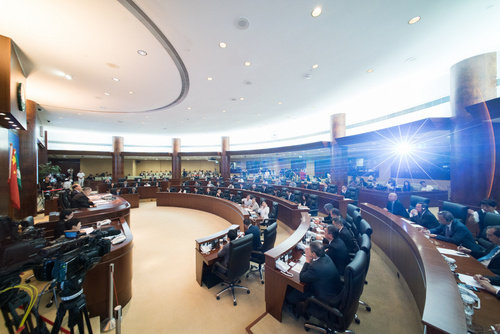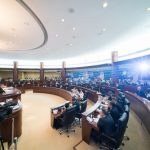 The Chief Executive, Mr Chui Sai On, attends a plenary session at the Legislative Assembly to answer questions raised by Assembly members concerning Government policy and social issues.
The Chief Executive, Mr Chui Sai On, attends a plenary session at the Legislative Assembly to answer questions raised by Assembly members concerning Government policy and social issues.
The Chief Executive, Mr Chui Sai On, today shared insights on talent development in Macao as a way to seize opportunities envisaged under development of the Guangdong-Hong Kong-Macao Greater Bay Area.
The Macao Special Administrative Region (SAR) Government is looking forward to the launch of a development plan for the Greater Bay Area, to be issued by the Central Government, in order to advance the Macao SAR Government’s own planning accordingly.
Mr Chui made the comments this afternoon during a plenary session of the Legislative Assembly, to answer questions raised by Assembly members concerning Government policy and social issues.
Nurturing specialised financial services in Macao was a key Government policy, Mr Chui stated. To pursue such a goal, the Government had been striving to: expand the city’s base of finance professionals by attracting a greater number of people with relevant skills from outside Macao; cultivate the talents of local individuals; and provide more in-post training.
The Government has formulated a list regarding which types of professional – including finance professionals – would be considered for priority clearance regarding any application for residence. The list covered a total of 10 positions in five industries, namely financial services; information technology; traditional Chinese medicine; Chinese-Portuguese translation; and MICE (meetings, incentives, conferences and exhibitions) business.
The Government would introduce additional measures to try to attract home those talented Macao people currently working in finance-sector roles outside Macao, added the Chief Executive.
To expand the number of locally-trained professionals in this sector, Mr Chui said the Government had been pressing ahead with three measures: 1) encouraging establishment of a greater number of finance courses in local higher-education institutions; 2) offering internship opportunities for local financial workers to gain experience in financial technology, asset management and insurance services at the China Development Bank and its subsidiaries; and 3) providing more in-post training for professions such as chartered financial analysts and registered financial planners.
In addition, Mr Chui said the Government would play a more active role in linking local small and medium-sized enterprises (SMEs) with opportunities arising from the Greater Bay Area. The Government’s plans included subsidies for local SMEs being extended to the nine mainland cities in the Greater Bay Area, plus Hong Kong; and provision of more support services for businesses setting up on the mainland. The Macao Trade and Investment Promotion Institute had already set up six offices in mainland cities.
Macao would be positioned as a global training hub for tourism, as agreed with the Central Government and other Greater Bay Area cities. Macao’s diversified world-class recreational facilities and currently extensive tourism training offerings contributed to Macao development in relation to the tourism and leisure industries. Expanding tourism-sector training would be a major contribution by Macao to the soon-to-be-launched development plan for the Greater Bay Area, Mr Chui added.
The Chief Executive said the Government acknowledged four important factors in relation to the city’s contribution to the development plan for the Greater Bay Area. They were:
1. That the Central Government attached great importance to the role and functions of Macao in the development of the Greater Bay Area;
2. That the Central Government expected Macao to make use of its advantages in order to promote complementary gains, mutual beneficial cooperation, and coordinated development; and to create a more favourable environment for Macao’s adequate economic diversification;
3. That the planning for the Greater Bay Area would emphasise the benefits that would accrue to the public, including a focus on development of a quality environment, and promotion of the well-being of the public. Such benefits would also include measures that enabled Hong Kong and Macao residents to work and live on the mainland; and
4. As the Government had long been participating in the studies and formulation of the framework plan of the Greater Bay Area, the Central Government had frequently heard, often adopted, and highly respected, the Government’s opinions.
The Guangdong-Hong Kong-Macao Greater Bay Area is a city cluster formed by nine cities in Guangdong Province (Guangzhou, Shenzhen, Zhuhai, Foshan, Huizhou, Dongguan, Zhongshan, Jiangmen and Zhaoqing), plus the Special Administrative Regions of Hong Kong and of Macao.


